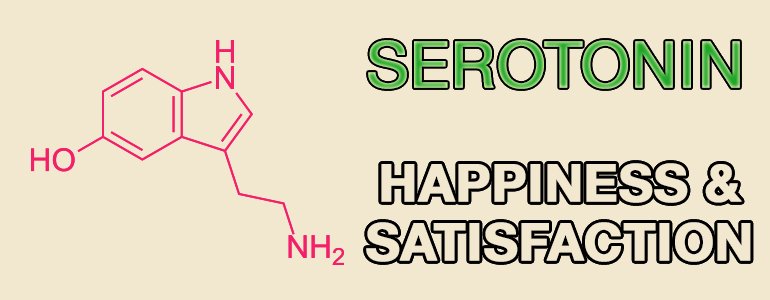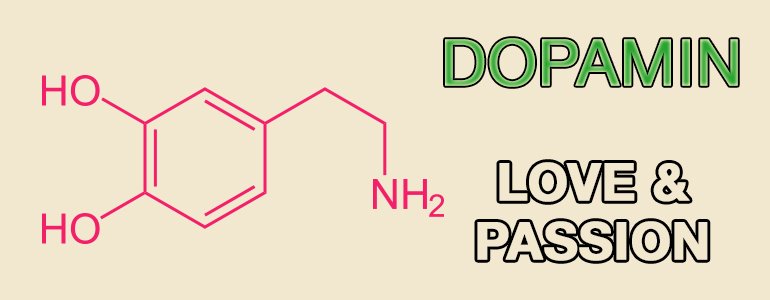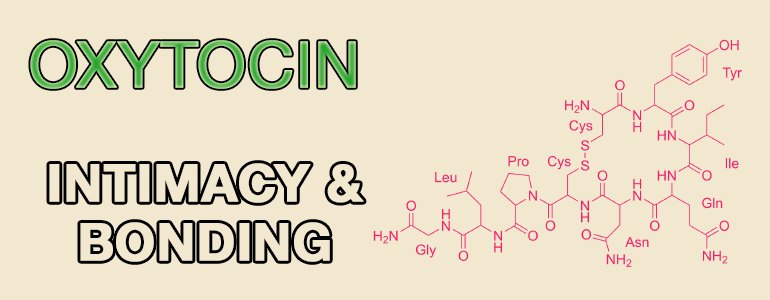The three so-called ‘happiness hormones’ are serotonin, dopamin and oxytocin. But how do they influence your mood and how can you boost them naturally to increase your happiness levels? Rae Bathgate investigates.
Everybody who’s gone through puberty – especially those in the midst of it – can tell you that hormones play a large part in how we feel. Most women, for one, are particularly aware of this, some even tracking the subtleties caused by the ebb and the flow of oestrogen and progesterone.
However, not as much conversation exists about how so-called 'happiness hormones', and neurotransmitters affect everyone’s mood and well-being. And yes, we do mean everyone, including animals, men, children, your next door neighbour, and especially you.
RELATED: Happiness Is A Choice: 8 Ways To Choose It Today
Hormones and neurotransmitters are molecules that act as chemical messengers. The main difference between the two is that hormones are released by the endocrine system as chemical impulses, while neurotransmitters are released by the central nervous system as electrical impulses. The two systems work together, so the line between the two becomes blurred, some molecules even acting as both (oxytocin, for example).
Happiness hormones: what exactly are they?
Human hormones tally at about 50, while known neurotransmitters have been estimated to be at around 100. The main ones associated with feelings of happiness are:
- Serotonin
- Dopamine
- Oxytocin
Other influential factors are adrenalin and cortisol, melatonin, GABA, endorphins and norepinephrine. Researchers also agree that many other factors influence happiness, such as economic stability and relationships, to name just two. It's important to remember then that while the effects of increasing happiness hormones and neurotransmitters are being researched, no neurochemical alone is a quick fix for happiness, as they act in lockstep with each other.
So, let's take a closer look at the three main happiness hormones:
1. Serotonin: happiness and satisfaction
Also known as 5-hydroxytryptamine (5-HT), serotonin is a complex neurotransmitter. Serotonin could be thought of, simply, as bringing about feelings of confidence and self-esteem. For example, serotonin has been shown to be at higher levels when you feel significant and like you're part of a group. Conversely, feelings of loneliness and depression are usually associated with low serotonin levels.
You may recognize the name from Serotonin-Specific Reuptake Inhibitors (or SSRIs), a popular type of medication taken against depression, anxiety, panic disorder, OCD, PTSD and eating disorders. While a breakthrough in mental health medicine, depression has been associated with various potential causes – not only low levels of serotonin.
• JOIN US! Sign-up to get support from our caring community •
Still, even if the key to a sunny outlook isn't simply just more of the neurotransmitter, research seems to indicate that to feel happier, it's good to try and avoid the happiness hormone serotonin dipping too low. Luckily, there's a wide variety of ways to give yourself a boost, now and then.
Higher serotonin activity allows people to put themselves in situations that will bolster self-esteem and increase one’s self-worth and sense of belonging; in turn, this ups your serotonin levels.
“While the effects of increasing happiness hormones are being researched, no neurochemical is a quick fix for happiness.”
To get this serotonin positive feedback loop going, challenge yourself as much as you can to accomplish activities that will reinforce your sense of self-worth, purpose and belonging. For example, try volunteering (which has also shown to strengthen social ties and to make you even happier), becoming involved in a cause you believe in or joining a sports team.
RELATED: Why is volunteering important?
How to increase serotonin levels naturally
Studies have shown that athletes have higher levels of serotonin. Indeed, exercise – such as riding a bike or mindful running – has been shown to increase serotonin, along with getting some sun, or a well-deserved massage.
Another way to up your serotonin is by reflecting on what you have in your life, for example, experiences, people, and things that make you feel grateful, loved and important. Your brain will produce serotonin regardless of whether a situation is imagined or is recalled as a memory.
Focusing on the positive – while it may not solve your problems – may help you feel better (and also help you to stop ruminating). Some ways to do this include taking the time to do positive affirmations, reflect, or writing a gratitude journal about all the things you appreciate – even looking back through old pictures of a great night out will make you smile and get that serotonin going.

Bike yourself better: cycling boosts serotonin, a happiness hormone
2. Dopamine: love and passion
Like serotonin, dopamine is a neurotransmitter. Often painted as the neurochemical most strongly associated with happiness, it might be more precise to say that dopamine is responsible for reward-driven behaviour and pleasure-seeking activities. You get a rush of it when you feel proud of yourself, when you eat comfort food, when it's pay day, and, of course, when you win.
Some studies indicate that those with more extroverted and outgoing personality types may have higher levels of dopamine than their introverted counterparts, and it could be one of the main driving forces behind pursuing goals, as procrastination and self-doubt have been linked to low levels of dopamine.

As with serotonin, this neurotransmitter's success in regulating our emotions hangs in a delicate balance: if too few dopamine molecules are released, Parkinson’s disease may develop (incidentally, dopamine levels also play a large part in motor reactions), defined by a slow loss of motor skills and mood and sleep disorders. On the other hand, too high of a dopamine level can lead to symptoms like mania, hallucinations, and it also appears to increase impulsive behaviour.
How to increase dopamine levels
While many highly addictive substances act on the dopamine system, by feeling success (however you may define it), you can increase your dopamine activity. For example, set a goal and achieve it. For overachievers, this may sound stressful, but there are healthy ways to organize goal setting.
For example, break down one big goal into several smaller ones, and pause to acknowledge each success. Then, you can try to set a new (realistic) goal while you're still working on your current objective. In short, more dopamine rewards beget more motivation to seek more dopamine, so, without going overboard, nurture that feedback loop.
Also, listen to music: music that makes you feel good, music that moves you, music that gives you chills! One study analysed levels of dopamine when participants listened to music that gave them these musical sense and concluded that, when it did, dopamine transmission was higher: music is inextricably linked with our deepest reward systems.

Feeling sound: listening to music boosts dopamine
Yet another study showed that exercise may also increase dopamine, as do tangible rewards, like food or money. So, find that one physical activity that motivates you to exercise regularly, try saving money (having money left at the end of the month is the reward!), and learning how to cook food that's delicious and healthy.
3. Oxytocin: intimacy and bonding
Oxytocin is a peptide hormone composed of nine amino acids, released from the pituitary gland, most notably controlling uterine spasms and breastfeeding stimulus. It's active during childbirth and physical contact, and it's been found to cause behavioural and physiological effects “such as maternal, sexual and social behaviours.”
• JOIN US! Sign up today and make new friends at happiness.com •
In other words, it facilitates social interaction and is (mostly) associated with positive social behaviour. Due to the significant correlation between social bonding and life satisfaction, then indeed, oxytocin levels could lead to a happier life.
Because oxytocin levels go up with breastfeeding between mother and child, hugging, intercourse, orgasm and skin-to-skin contact, it's often referred to as the 'hug hormone' or the 'bonding hormone.' Indeed, some studies have shown that an increase in oxytocin also increases trust.
“Exercise, like riding a bike or running has been shown to increase serotonin, along with getting some sun, or a well-deserved massage.”
However, this happiness hormone has other, more complicated effects. According to Ed Yong on Slate, oxytocin "fosters trust and generosity in some situations, but envy and bias in others.”
Indeed, one study found that oxytocin uptake increased feelings of envy and schadenfreude (the pleasure derived by someone from another person's misfortune), while another suggested that while it increased a sense of closeness in one’s clique, in some individuals, it increased mistrust in strangers.
In other words, the trust and bonding that it offers may only extend to those that you trust and feel open to bonding with, to begin with (and there may be deep seated evolutionary origins in this reaction).
The hug drug: skin contact boosts oxytocin, a hormone of happiness
Be that as it may, while oxytocin may not be solely responsible for positive human bonding, it still plays a large part in how we interact with others. Oxytocin is released during moments of shared intimacy: be it familial, platonic, romantic or sexual.
How to increase oxytocin levels
There are a few ways you can naturally boost your levels of this hormone of happiness:
- Take part in group activities (and if they’re physical, even better!)
- Make sure to take the time to cuddle your loved ones
- Get a dog (or another pet)
In fact, if you own a dog, chances are your oxytocin levels (and his, or hers, for that matter) are the last thing you need to worry about. Studies have shown that not only does petting and spending time with your dog raise oxytocin levels in both, but simply gazing at each other sends oxytocin levels soaring.
The other neurochemicals of happiness
• Endorphins
The name translates as "self-produced morphine" for a reason: it's widely known for its analgesic (pain-relieving) properties. This neurotransmitter is present in large quantities during high-intensity cardio, strength training, sexual intercourse, orgasm, and most strenuous physical exertion. Exercise will increase your endorphins, as does acupuncture and laughter (even the anticipation of laughter raises endorphin levels).
• GABA
This is an inhibitory molecule that slows down the firing of neurons, making you calmer. You can increase GABA by doing meditative activities, like gardening, knitting, mandala colouring, different types of yoga (such as gratitude yoga), and, of course, meditation. The benefits of meditation are many and proven.
• Adrenalin (Epinephrine) and cortisol
A hormone/neurotransmitter and a glucocorticoid respectively, these two are released from the adrenal glands: they regulate stress (think of an adrenalin rush). Through more studies are needed, it appears that subjects with lower levels of salivary cortisol and urinary adrenaline levels report higher levels of happiness; while the results could be correlative and not causative, it's never a bad idea to try to reduce your stress levels.
• Melatonin
Melatonin is produced by the pineal gland as is most commonly associated with regulating sleep. However, it's also been shown to affect our overall well-being and feelings of happiness (sleep patterns are often disrupted as a symptom of a larger mood disorder). To keep your melatonin balanced, get a good night's rest, and make sure to turn off your electronic devices well before you head to bed.
Norepinephrine
Similar to dopamine, low norepinephrine (AKA noradrenaline) levels have been linked to depression, while further research has indicated that selective norepinephrine re-uptake inhibitor antidepressants "induce a positive emotional, perceptual bias in healthy subjects.” There are many ways to increase your norepinephrine levels, for example, taking a cold shower or a quick nap.

Win with a grin: laughter boosts happiness hormones
All in all, happiness hormones and neurotransmitters aren't as simple as we sometimes wish they were. One neurochemical isn't responsible for a single function, and a happier life isn't as simple as raising each level as much as we can. Indeed, like most things in life, it relies on a delicate balance. The good news is that the more you take care of yourself, the better the balance will be, and the happier you will feel.
After all, "our brain has evolved to make things that are necessary for our survival feel good," as one Guinness World Record holder speculated:
- spend time with friends
- get enough sleep
- avoid stress (perhaps through the benefits of MBSR)
- laugh often
- cuddle your loved ones
- get a dog
- work towards your goals
- practise gratitude
- exercise often.
Luckily, many of these tips to boost our happiness hormones and neurotransmitters are relatively easy to put into place with just a little effort from ourselves! ●
Main picture: colourbox.com
happiness.com | The fine art of being: learn, practise, share
Are you a happiness.com member? Sign up for free now to:
■ enjoy our happiness magazine
■ share and support in our happiness forum
■ Develop with free online Academy classes
Written by Rae Bathgate
 Rae Bathgate is an American journalist based in Barcelona, where she enjoys sunlight, yoga, and bookbinding.
Rae Bathgate is an American journalist based in Barcelona, where she enjoys sunlight, yoga, and bookbinding.






Join the conversation
You are posting as a guest. If you have an account, sign in now to post with your account.